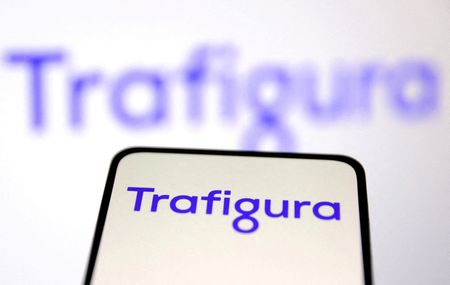By Emma Farge
BELLINZONA, Switzerland (Reuters) -A Swiss judge questioned a Trafigura board member on Thursday over the trading firm’s dealings with a consultant referred to in the firm’s corruption indictment as “Mr. Non-Compliant” who was allegedly part of a chain of intermediaries used to bribe an Angolan official.
Swiss prosecutors say that Trafigura and three other defendants paid bribes of more than $5 million via a network of middlemen to an Angolan official to win oil deals from 2009-2011. The case is the country’s first trial of a company charged with corrupting a foreign official to go before its highest court.
Trafigura, which describes itself as a leading supplier of commodities, has said that the anti-bribery and anti-corruption controls and the compliance programme in place at the time at its parent company met legal requirements and good practice standards.
Trafigura Director Pierre Lorinet, who was chief financial officer when the payments were allegedly made, took the stand as a witness on Thursday and was questioned for over four hours about the trading house’s policies.
“We cannot guarantee zero risk, it’s not possible,” said Lorinet, who is not a defendant in the case.
The court was shown memos, emails and messages involving an ex-Trafigura employee who the indictment says was nicknamed “Mr. Non-Compliant” by late Trafigura founder Claude Dauphin because he did things that were forbidden inside the group.
Dauphin’s family lawyer Roman Pinösch said the only evidence of the nickname came from the ex-employee’s personal notes and memos – evidence that he has been denied permission to see. The family, including son Guillaume who is attending the trial, has previously said Dauphin has been singled out unfairly.
The indictment alleged “Mr. Non-Compliant,” who worked for Trafigura from 1997-2007 and has given evidence to prosecutors, offered consulting services to Trafigura. He was also a controller, or accountant, at a British Virgin Islands (BVI)-registered company through which payments to the Angolan official flowed, the indictment said.
Reuters did not name the former employee, who is not a defendant in the case, because Swiss privacy rules forbid it. He could not be reached for comment.
When asked by Swiss judge David Bouverat about the BVI firm’s payments, Lorinet said: “It is not possible to verify every payment each day. It would require an army.”
He said Trafigura made hundreds of such transactions daily and did not have direct knowledge of the alleged payments in this case.
‘ON BEHALF OF TRAFIGURA’
The panel of judges showed a memo obtained by prosecutors they said was written by “Mr. Non-Compliant” in which he said he “never applied for this role” and said that Trafigura employees at the time, including Lorinet, had asked him to take it on.
Lorinet acknowledged the memo referred to him, but said that other details were unclear. Asked by the judge who had hired the consultant, Lorinet said: “I don’t know. It wasn’t me.”
Judges showed another email written by the consultant with the sign-off: “As instructed for and on behalf of Trafigura Beheer”. Asked by Bouverat why an external consultant would say this, Lorinet said: “I don’t know why he used that signature.”
Judges showed the court an email dated November 2009 between the consultant and former Trafigura executive Mike Wainwright indicating the consultant had been granted permission to use Trafigura’s internal system Pluto, used for trading and invoices.
Lorinet said that did not appear to be a problem because he was a former Trafigura employee and had completed training.
Wainwright, now retired, is a defendant in the case in a rare instance of a top trading executive being tried in a criminal court. His lawyers have said he rejects all the allegations against him and is confident the case will be dismissed. Trafigura said in 2019 it would stop using intermediaries for business development purposes after a series of investigations into its dealings.
Earlier this week, the court rejected arguments made by Trafigura’s lawyers to either throw out the trial or to strike out a portion of evidence from a key witness.
The court, however, is weighing a request to discard a portion of the evidence that is more than 15 years old, citing a statute of limitations. That would exclude evidence concerning the visit of the Angolan official to Geneva in April 2009 and the opening of a Swiss bank account.
The defendants face a maximum sentence of five years in prison. Trafigura faces a fine of up to 5 million Swiss francs ($5.60 million), although a higher compensation penalty is possible. The final ruling can be appealed to the same court.
((Reporting by Emma Farge; editing by Barbara Lewis and Leslie Adler)

